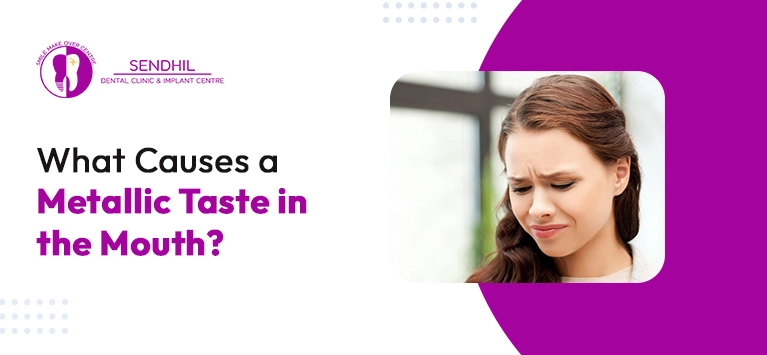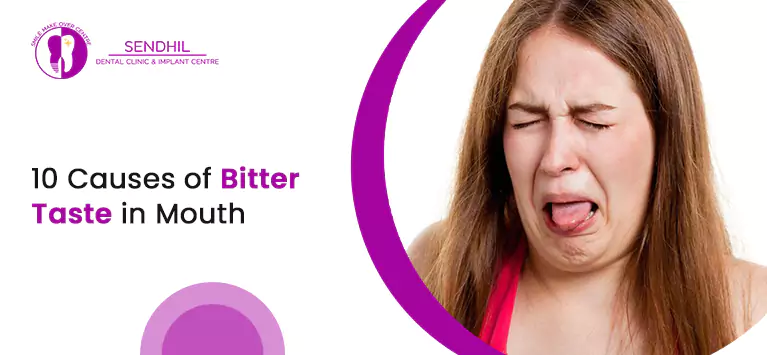
What Causes a Metallic Taste in the Mouth?
Experiencing a metallic taste in the mouth can be a symptom of an underlying condition, such as in rare cases of an infection, cancer, or an autoimmune disease. Most cases of metallic taste are not severe and will go away on their own with time or when you restore good oral habits. To prevent the metallic taste from returning and to avoid decay or potential new cavities in the future, practice good oral hygiene.
Table of Contents
Common causes of Metallic taste in mouth
Medications
A medication is often blamed for a taste like metal in your mouth. Many drugs of this type (especially antibiotics, antidepressants, and antihistamines) can cause taste alteration. This happens as medications can be excreted through saliva, which directly affects taste buds, or they can interact with CNS, altering taste sensations. Medications frequently having this side effect include:
- Antibiotics: Such as metronidazole and tetracycline.
- Antihistamines: Used for allergies, like Claritin and Benadryl. It has to be said that the group of antidepressants, including lithium and specific SSRIs, are in the focus.
- Blood pressure medications: Like captopril.
Dental Issues
Oral health influences can alter our taste sensation. Dental causes such as gingivitis, periodontitis, infections, etc., release a metallic taste. Plaque or cavities caused by poor oral hygiene can also lead to the same. Dental work that uses metallic elements, like filling a tooth or making a crown, can sometimes cause a sudden metallic taste in the mouth.
Dietary Factors
Certain foods and nutritional supplements can cause a metallic taste in the mouth or otherwise abnormal taste. Although medications or dietary supplements most often cause a metal flavor in the mouth, they can also be a symptom of severe underlying conditions (such as chemical exposures and some cancers). Chemotherapy and radiation can produce the same results. Some common medical conditions that can cause a taste like metal in the mouth include ear or upper respiratory infections such as sinusitis, as well as head injury or conditions that damage the central nervous system (CNS).
Infections and Illnesses
Upper respiratory infections, such as colds, sinusitis, flu, and other diseases, such as COVID-19, can distort your sense of taste. They do this by causing inflammation and congestion in the upper nasal passages, which are directly connected to your mouth. Certain chronic illnesses, like diabetes and diseases of the liver or kidneys, can also cause a metal flavor in the mouth as a result of changes in metabolic functions.
Fewer causes of metallic taste in the mouth
- Neurological Conditions: Specific brain or neurological disorders can alter the usual sensation of taste. In fact, some disorders or conditions can cause a persistent metallic taste in your mouth. Neurological conditions that can cause saliva overproduction when swallowing include Parkinson’s disease (PD), cerebral palsy, and stroke.
- Pregnancy: The weird metallic taste during pregnancy is a common early pregnancy symptom. When you’re pregnant, those hormone levels can increase, damage and cause your mouth to taste rusty.
- Environmental Exposure: One could be exposed to a metal flavor in the mouth as a result of being exposed to some chemicals and heavy metals. This type of thing can happen if you inhale, ingest, or your skin gets into contact with substances like lead, mercury, or some types of pesticides. Occupationally, metalworking, e.g., in industries that deal with metals or chemical manufacturing, is also a risk factor.
Diagnosis and Treatment
If you have a continuing preference for metal taste, it is of utmost importance to find out the underlying cause. These are the following situations you could make changes to:
- Review Medications: When you strongly believe that a medicine is the root of the problem, you should get advice from your healthcare provider. They might adjust the dosage or propose a different drug.
- Oral Hygiene: Clean your teeth as often as possible. Visit your dentist for regular check-ups and to prevent dental issues.
- Dietary Adjustments: Watch what you eat and eliminate the foods or supplements that make your food taste like metal.
- Medical Consultation: If the metallic taste persists, go to the doctor. Doctors can run tests to see whether you are infected, sick, or exposed to dangerous substances.
Preventive Measures
Eliminating the metal taste requires pinpointing the probable triggers:
- Stay Hydrated: Drinking water in sufficient quantities can remove fluids from the mouth, which might be the reason for the metallic taste you are experiencing.
- Quit Smoking: If you are addicted to smoking, the requirement of the taste buds is that it kills the cells and gives you a taste of metal in your mouth. The stopping of tobacco facilitates the promotion of the overall health of dentition and taste sensation.
- Balanced Diet: Eat a nourishing diet that is present with essential amino acids and mineral salts to avoid a decline in taste resulting from vitamin deficiencies.
- Regular Check-ups: Do not forget to go to a doctor and dentist for them to outline and rectify an issue before it becomes a taste disorder.
When to Seek Help
On the one hand, the sudden metallic taste in the mouth is commonly considered a temporary and benign illness, but it could be the first sign of an underlying disease. Medical attention needs to be sought if:
- A metallic taste that is either constant or growing stronger than you have bothered to taste.
- Other signs like shortness of breath, edema, or skin rashes can be combined with the above symptoms.
- Fever, cough, or sinus problems are the infection symptoms that are still observable.
- Among the symptoms, the neurological ones, that is, problems with speaking, weakening of the muscles, or changes in vision, are also quite significant ones to be observed.
Conclusion
This may be caused by many reasons, like taking common drugs or having complex medical problems. Understanding these can help one find relief. If it continues, consult your doctor for more details on what could be wrong and how best to handle it. Maintain proper oral hygiene, drink enough water, and watch what you eat to prevent and manage this distasteful disturbance.





